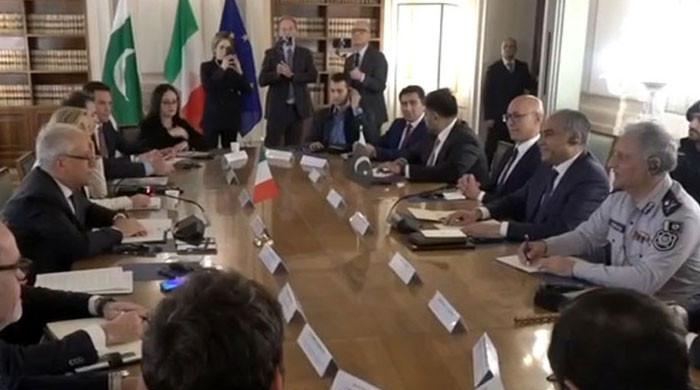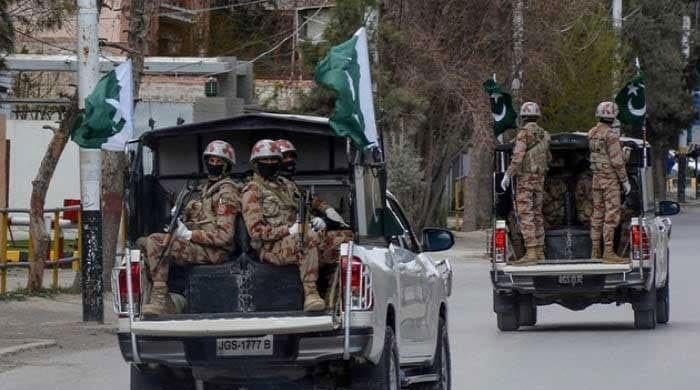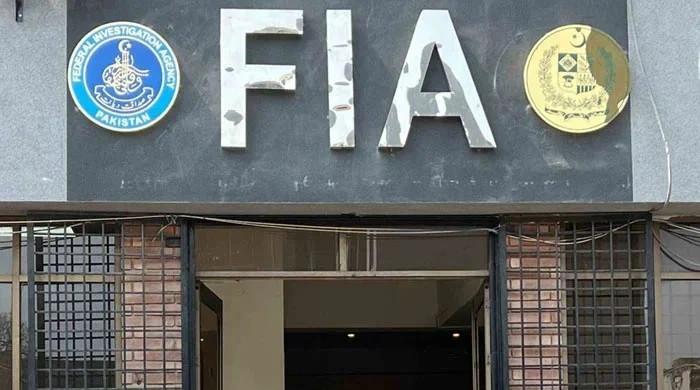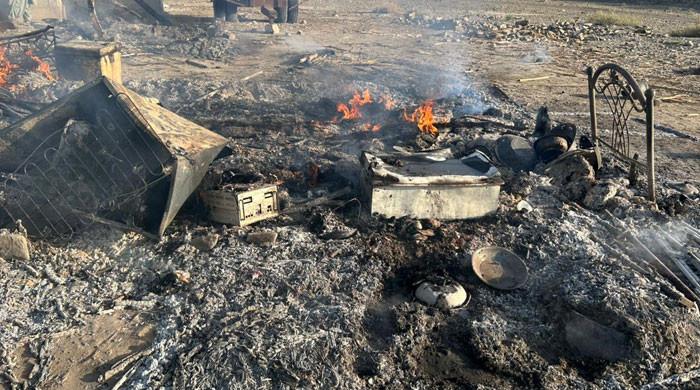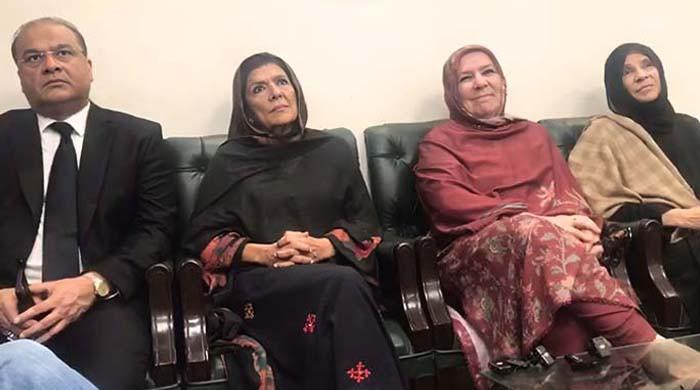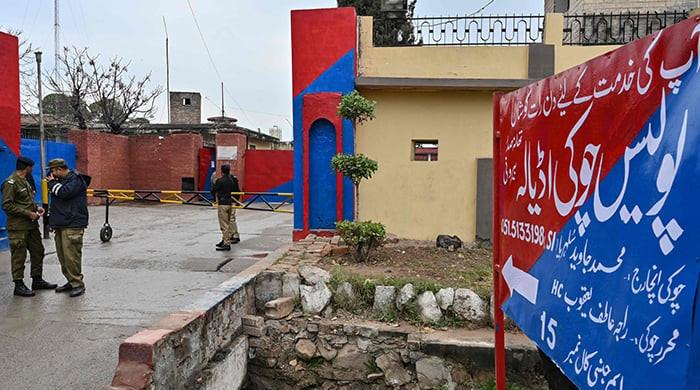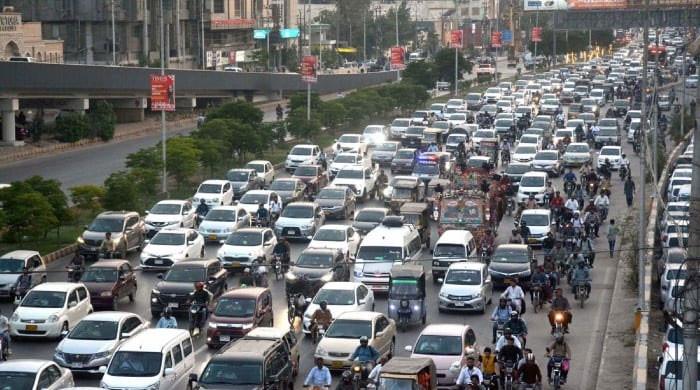Bilawal urges world to press India for comprehensive dialogue with Pakistan
Root cause of terrorism in IIOJK is unresolved agenda of Kashmir before UNSC, says Bilawal at UN briefing
June 03, 2025
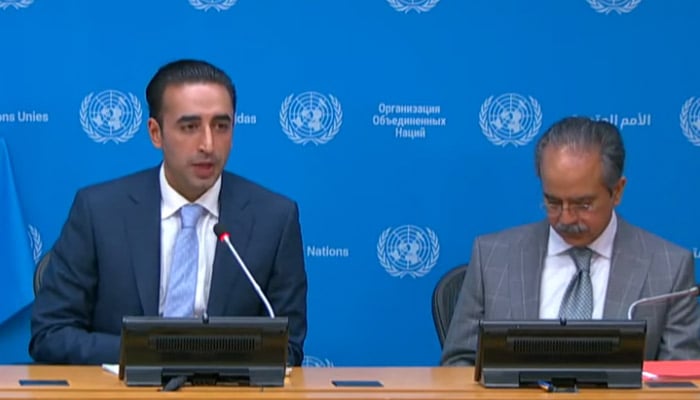
- Bilawal warns that Pak-India conflict lowered conflict threshold.
- Says India using terrorism as political tool to demonise Muslims.
- "We would still like to cooperate with India to combat terrorism."
Pakistan Peoples Party (PPP) Chairman Bilawal Bhutto-Zardari has urged the international community to push India towards a comprehensive dialogue with Pakistan, warning that the recent military escalation between the two nuclear-armed neighbours has dangerously lowered the threshold for conflict.
“Ceasefire is a welcome first step but it is only a first step. I must emphasise that the global community today is less safe post this ceasefire... it's simply because the threshold for full-blown military conflict between two nuclear-armed states has come down, it's not gone up,” he said while addressing a press conference at the UN Headquarters on Tuesday.
The former foreign minister, along with a nine-member high-level parliamentary delegation, is currently in New York, US, on a two-day visit to present Pakistan’s stance on the recent military confrontation with India and to challenge New Delhi’s narrative at the international level.
Members of the parliamentary delegation include, Hina Rabbani Khar, Sherry Rehman, Dr Musadik Malik, Khurram Dastgir Khan, Jalil Abbas Jilani, Tehmina Janjua, Bushra Anjum Butt and Syed Faisal Subzwari.
Addressing the presser, Bilawal noted that on May 7th India launched illegal strikes within Pakistan in violation of the United Nations charter and international law.
They targeted civilians’ infrastructure, religious worship places, dam and water and energy infrastructure, with innocent civilians, women and children losing their lives, the PPP chief added. He said India used Pahalgam attack as a pretext to launch attack inside Pakistan.
“We express our sympathy with the victims of terrorism and Pakistan has consistently and unequivocally condemned terrorism in all its forms and manifestations,” said Bilawal.
Following this terrorist attack in Indian Illegally Occupied Jammu and Kashmir (IIOJK) on April 22, Prime Minister Shehbaz Sharif offered publicly to India that Pakistan was ready to be part of any impartial international investigation into this attack.
“We did so because we were confident, our hands were clean and we had nothing to do with this terrorist attack.
“Indian government refused Pakistan's offer and chose instead to conduct their illegal strikes. Pakistan only ever acted in self-defence, we never initiated any violence against India.
On the first night, when their planes attacked our country, Pakistan military responded with precision.. they only targeted and downed six planes because we believe those six planes were the ones who released their load on Pakistan.”
Subsequently, Indian government launched missile strikes into Pakistani territory and Pakistan military responded in kind.
He credited international community particularly US President Donald Trump and his team led by Secretary of State Marco Rubio to help the two countries in achieving a ceasefire.
“We’ve seen during the course of this conflict how quickly the escalation ladder between the two countries rose and the concern is that the next time such an incident they may not be time for international community to intervene before things get a lot worse that is why this is absolutely important for Pakistan but for international community by enlarge to continue to pursue dialogue and diplomacy that are the only viable path to peace.”
Bilawal, who also served as foreign minister in previous PDM-led coalition government, said Pakistan wanted a comprehensive dialogue with India on outstanding issues including terrorism.
“The single largest number of terrorist attacks that take place at any one country is Pakistan. The single largest number of victims of terrorism is Pakistan. I myself have suffered at the hands of terrorists..my mother [Benazir Bhutto] who was assassinated by the terrorists.”
The political leadership of fought against these beasts these terrorists on front line..our military leadership has fought these beasts on battlefield, they have earned their honours and their titles and their promotions as a result of taking them on in South Waziristan and North Waziristan.”
Bilawal recalled that last time he visited the UN as the foreign minister of Pakistan and the country managed to go through the Financial Action Task Force (FATF) process.
“We had the FATF as an organization endorse that Pakistan has taken the appropriate measures for counter-terrorism for combatting terror financing,” he said while referring to the removal of Islamabad from global terrorism financing list.
“It has become too easy internationally for hegemons wanna be hegemons to use the wolf whistle of terrorism to justify illegal actions, violent actions...”.
Bilawal said India was using terrorism as a political tool to demonise Muslims within country, in IIOJK, and in region.
“Pakistan would still like to cooperate with India to combat terrorism we can’t leave the fate of 1.5 or 1.7 billion people in the hands of non-state actors and terrorists for them to decide at a whim that two nuclear armed powers will go to war and this is the new normal of the new abnormal that the Indian government is trying to impose on the region.”
“That if there’s a terrorist attack anywhere in India, anywhere in IIOJK it means war with Pakistan. And reciprocity would mean that any terrorist attack in Pakistan, particularly given our long list of complaints about Indian involvement in Balochistan and KP with BLA, war with India. That is untenable you can’t have no dispute resolution mechanisms between two nuclear armed countries.”
In addition to a dialogue on terrorism, Bilawal hoped that both countries would agree to complaint mechanism to jointly resolve bilateral issues.
He said the root cause of terrorism in IIOJK is the unresolved agenda of Kashmir before the United Nations Security Council.
“Their promises that we made as an international community to the people of Kashmir that India made to the people of Kashmir those promises are still not kept,” he lamented.
Bilawal warned that there will forever be a bone of contention between India and Pakistan “if we’re going to continue to ignore this [Kashmir] issue and allow that wound to fester”.
In addition to Kashmir, Bilawal said the most recent front that India has opened in the context of this crisis is the weaponisation of water.
The violation of the Indus water treaty by the Indian government must be condemned across the board, he said adding that Pakistan cannot allow this precedent to be set this mere threat to cut off the water supply for 200 million people of Pakistan that is a violation of the UN charter.
“Acting on this threat would be seen as an act of war by Pakistan. This is not something I say with any pleasure. Pakistan dose not seek to be in this position but I ask any country their lifeline is being cut off if their water supply was being cut off how would they react.”
The PPP chief said the weaponisation of water given the challenges of climate change, water scarcity facing Pakistan “is something that surely no civilised country can endorse, no civilized country must allow for this precedent to take root”.
Bilawal said Pakistan has appealed to the international community to assist it in its pursuit for peace just as the international community played its role in encouraging India to agree to a ceasefire, to engage in a comprehensive dialogue with Pakistan “so that we can address that issues and achieve peace”.
“I would like to know that India likes to present itself is a net security provider. The US subsidises the economy the Indian military on the basis that it’s to be a net security provider. India’s actions have shown as a result of this conflict that they are source of insecurity, not a source of security for the region, the true net security provider for our region and beyond would be peace between India and Pakistan.”
He said US President Donald Trump has a unique opportunity to deliver on his commitment to peace within the context of India and Pakistan.
The US enjoys good relations with Pakistan and India. From tomorrow we will be starting our engagements in DC where we will be engaging with representatives of US govt the US parliament and we will be seeking to encourage the US and other international players to play their role to facilitate this process.”
Responding to a question, Bilawal said absolutely Israeli drones were used during India’s attack on Pakistan.
“The actions of Indian government post 2019 to do with the imposing demographic changes within Kashmir does draw parallels by between what settler programme within the West Bank as far as being inspired, India being inspired by the Israeli government unfortunately its being inspired in all the wrong ways.”
He said India’s conduct was outside of international law, the UN Charter and the arrogance with it thought “it could get away with this that you can just scream terrorism and it justifies that you can attack any Muslim country at whim”.
Furthermore, he said: “Modi is sort of Temu version of Netanyahu. It’s a little poor copy and we call upon the Indian government to not be inspired by the worst example possible.”
Pakistani delegation meets French ambassador
Earlier in the day, the high-level parliamentary delegation met Permanent Representative of France to United Nations, Ambassador Jerome Bonnafont, and briefed the French ambassador regarding the alarming security developments in South Asia following India’s recent military aggression and unilateral actions.
Bilawal apprised him of the grave consequences arising from India’s baseless attribution of the Pahalgam attack to Pakistan without any credible investigation or evidence.
He condemned India's unilateral military strikes against civilians leading to deaths and injuries and damage to civilian infrastructure in Pakistan, the holding in abeyance of the Indus Water Treaty, and India’s persistent belligerence — actions that violate international law and threaten the fragile strategic balance in the region.
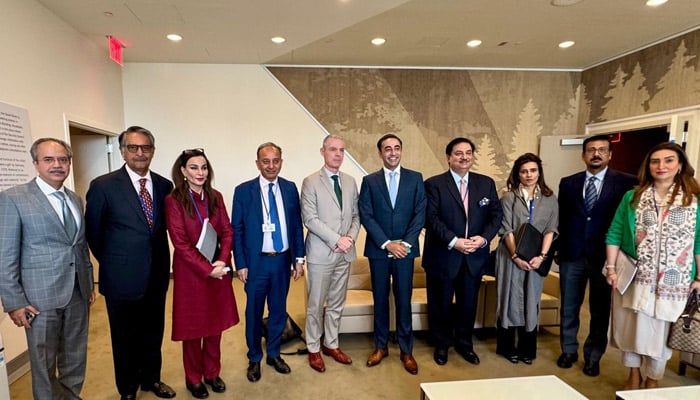
He also emphasised Pakistan’s responsible and restrained conduct in the face of Indian provocations, adding that Pakistan’s response was guided by the principles of international law and the UN Charter. He warned against India’s attempt to impose a so-called “new normal” of arbitrary strikes, noting the serious implications such conduct holds in a nuclearized region like South Asia.
Bilawal underscored the imperative of a peaceful resolution of the Jammu and Kashmir dispute in accordance with relevant UN Security Council resolutions for durable peace and stability in South Asia. He urged France to play a role in ensuring a sustained ceasefire, revival of the Indus Waters Treaty, and initiation of a comprehensive dialogue between Pakistan and India.
The French ambassador expressed his country’s support for regional peace and stability and need for bilateral dialogue between India and Pakistan. He reiterated the importance of restraint, dialogue, and adherence to international obligations.




